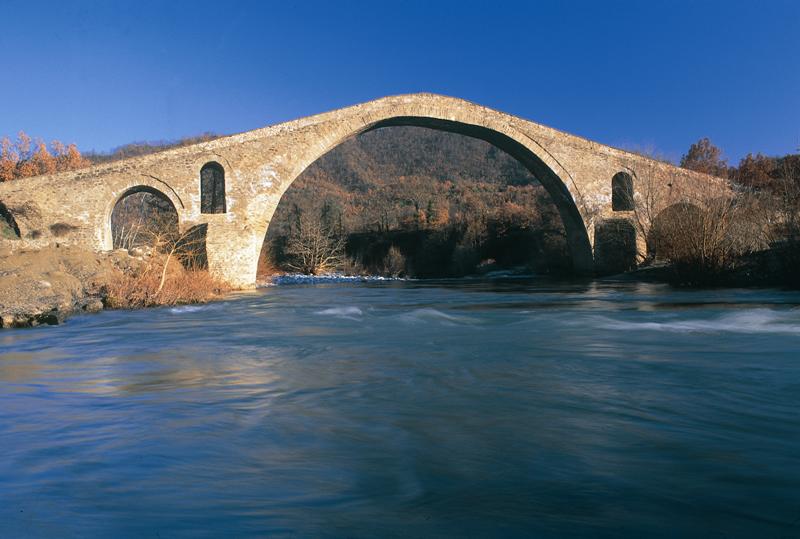Kolianta
At the beginning of December and until the 23rd of December, young boys climb a hill every day and announce the Nativity of Christ by shouting "kolianda" (carol). On Christmas Eve, the children sing carols while holding the "turva" (sack), to put inside the gifts (bread, nuts) that they will receive from the householders, and the "tsumbanikas" (poles with a round end). The chumbanika was used for stirring, "swibbing", the fire in the houses they visited. During the visit, they sang "Kolianda babbo m' kolianda, and me babbo m' klura, and me the youngest both now and next year. And if you don't give us kolyanda, give us a siujiuki, let it be jerky, let it be thick, let it be sugary. And if you don't have a shujiuki, give me your daughter
Surva
To herald the New Year, young boys ring the church bell shouting "Surva". Surva in Thrace is the name of krania, the deciduous tree with rich foliage and hard wood. It is said that the Trojan Horse was made from skull wood. The children, instead of poles, held branches of skulls and with these they hit passers-by on the back to convey their strength. The blows were accompanied by the words "Surva, surva, strong body, strong cross...".
Gournohara
On Christmas day, the villages of Grevena (e.g. Amygdalies) slaughter the pig. The families fed the pig well so that it would grow fat and have a lot of meat. The slaughtering and skinning of the animal was done by experienced people because the skin of the carcass had to be kept smooth in order to be used later in the manufacture of "pig boots" (shoes). The meat cut into pieces was boiled with leeks and spices and made into sausages. The fat (the pasto) was melted and kept in containers for the whole year. Many times they put pieces of boiled meat (crab) into the melted fat (ligda) and kept it until the summer. The pig's head and feet were used to make tripe.
Rugucaria
The custom of rogucaria or rugucaria, which revives on New Year's, has its roots in the era of Turkish rule. The boys of the village disguise themselves as women (bulas) and choliades (captains). Other disguises that are common are those of the priest (with cassock and basil in hand), the ruguchari (painted black and wearing bells) and the nurse. The captains tease the women, dance, sing ("Santa Claus is coming, January dawns, Santa, where do you come from, and where do you come from. I come from abroad and go to yours...") and visit the housewives. The villagers offer them meat, sausages, wine, which they cook and eat in the evening at the feast.
"Andromana"
It is a rare custom that revives in Deskatai Grevena on the first Friday after Easter. "Andromana" symbolizes the Virgin Mary, who suffered with the death of her son, but also Spring, the rebirth of nature. The custom has its roots in the Turkish rule. In the central square of the village, 20 people dance slow traditional dances in a circle. The songs (e.g. "ta Livadia") refer to the years of Turkish slavery and the longing for freedom. At the end, the Andromana is danced, a fast, cheerful dance, by men forming a human pyramid. Six men lift 5 men on their backs and they in turn lift 4 men and another 3 to the top of the pyramid. During the dance of Andromana, it is sung "now, dear Paschalia, now and next year...
Anakatosaria
On the last weekend of Halloween, a three-day Halloween musical "party" takes place in the central square of Grevena. From 1900 to 1975, this three-day feast was celebrated in the city by lighting huge bonfires. With the establishment of the institution of "Remixers" in 2001, until today, various musical events are organized mainly with Balkan sounds, originality, black atmosphere, melancholy and a lot of madness. This is not a carnival parade with dances but a musical route, a dynamic revival of tradition with new elements adapted to today. The visitor follows the music in the streets of the city with brass bands, percussion groups, skilled musicians..., eating pies and mushrooms and drinking until morning.
Mushroom Festival
Towards the end of August, the Panhellenic Mushroom Festival takes place for three days on the banks of the Venetian river. The purpose of the celebration is the exchange of knowledge, experiences and the tasting of various mushroom flavors. The celebration is organized by the Association "Mushroom Lovers of Western Macedonia" and is financed by the Prefectural Government of Grevena. The area has a tavern, a refreshment room, a children's playground, a mycology workshop, a bazaar of local products, exhibitions... etc. Visitors and campers can go horse riding, swimming, mud baths, canoeing along the river, mountain biking, climbing, archery. They can also try mushroom pickling, look at mushrooms under a microscope in the mycology laboratory, watch music concerts.
Editor: Niki Kalopaidis
